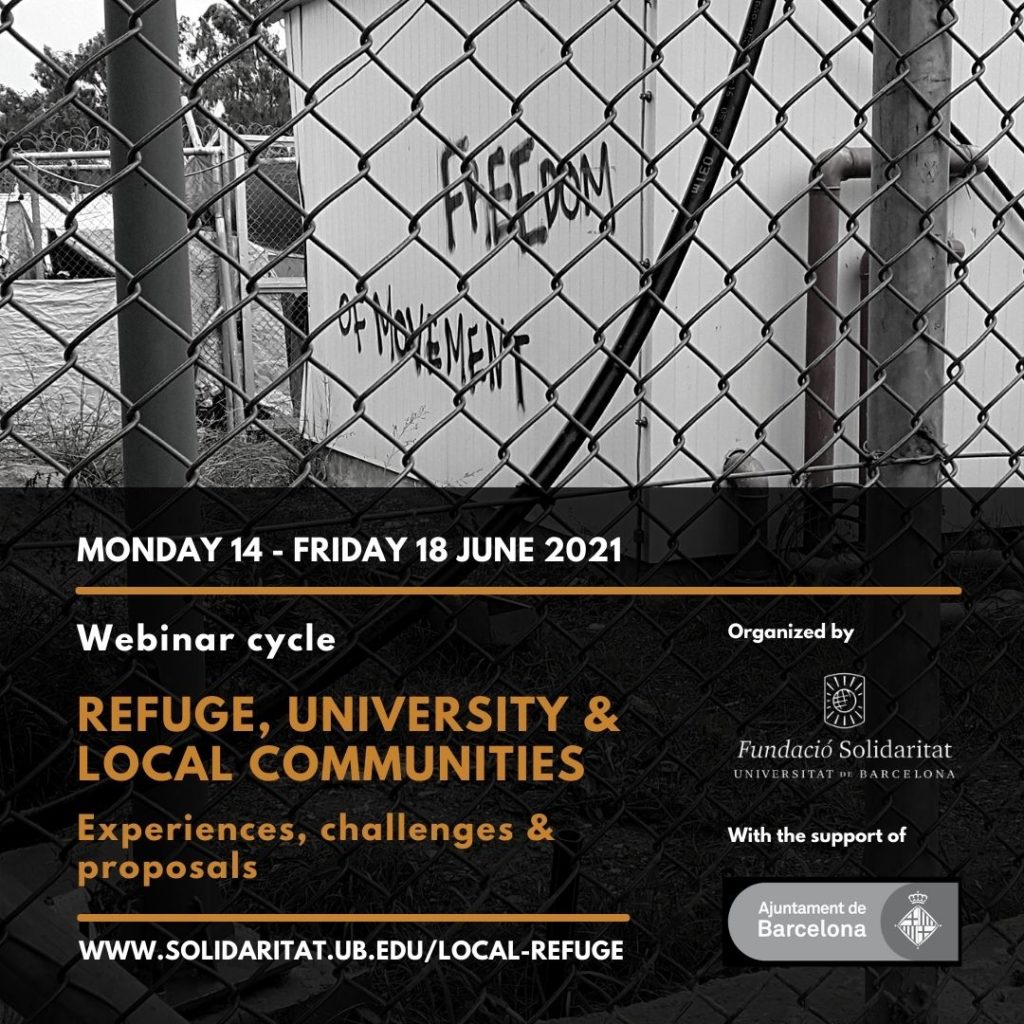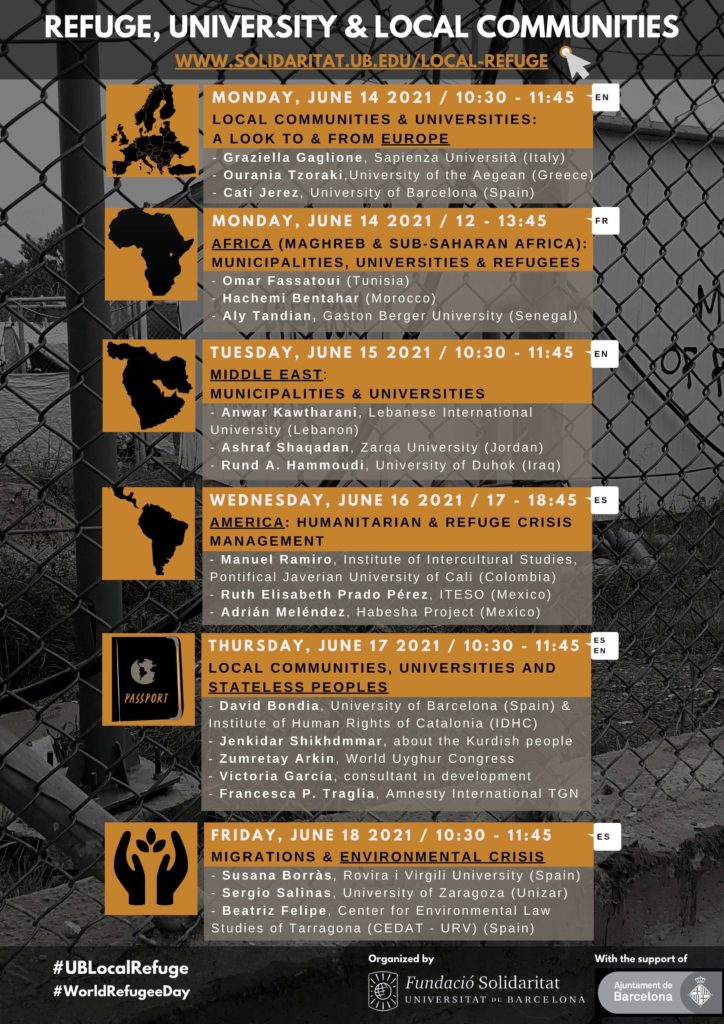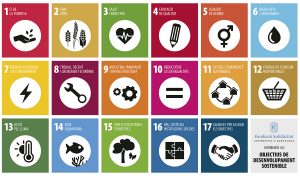Organized by the UB Solidarity Foundation, the seminars “Refuge, university and local communities” will take place from June 14 to 18, 2021 through Zoom (with simultaneous translation into Spanish) and Youtube.

One of the main features of the Support program of the University of Barcelona for refugees and people from conflict areas is networking, both internally at the university – where actions and collaborations with faculties, departments and areas of the UB are specified – as in an interuniversity and external level – where, since 2015, contacts, collaborations and agreements have been established with public administrations, schools, companies and entities working in the field of refuge.
In particular, the progress, growth and consolidation of the Program, coordinated by the UB Solidarity Foundation, is closely linked to networking with local communities.
On the one hand, the University of Barcelona collaborates with the Department of Global Justice and International Cooperation of the Barcelona City Council, with which it promotes and co-finances the flagship project of the initiative: the University Transition Course. This course has already been held three editions and has awarded scholarships to forty-five refugee students in situations of economic and human rights vulnerability. On the other hand, the town councils of Viladecans and L’Hospitalet de Llobregat and the Diputació de Barcelona have contributed to the accommodation of the students accepted by the Program in shared flats, within the framework of the second phase of socio-educational integration.
For all this, preceding World Refugee Day (June 20), the UB Solidarity Foundation promotes the six webinars cycle “Refuge, university and local communities”, in the framework of an agreement with the Barcelona City Council (“Enhancing synergies to face the challenges for global justice from the university: education, research and action”). Its aim is to analyze and debate how the alliance between the university and local communities can foster the reception of migrants and refugees and thus promote cohesion and social inclusion with a clear human rights perspective. The webinars will also look at the challenges that both universities and local communities are facing in this area. The sessions are free and will take place the week of June 14 to 18, 2021, at different times and with live chat, through the Zoom platform (includes simultaneous translation from English/French into Spanish) and the UB Solidarity Foundation’s Youtube.
The presentation of the cycle will be in charge of the vice-rector for Internationalization Policy of the UB, Markus González, and the director of Global Justice and International Cooperation of the Barcelona City Council, David Llistar. The cycle will start on Monday, June 14 with two meetings: from 10:30 to 11:45, the seminar “Local communities and universities. A look at and from Europe”, on the main initiatives and lessons learned by universities and the European local communities in the field of the reception of migrants and refugees; and, from 12 to 13:45, the seminar “Africa: municipalities, universities and refugees“, on the situation of migration and forced movement of people in the Maghreb and Sub-Saharan Africa, and on some possibilities for cooperation and exchange with the African continent. The first seminar (in English) will be attended by Graziella Gaglione, from the Sapienza Università di Roma (Italy), who will present the UNICORE – University Corridors for Refugees project and the mentoring project developed by the Sapienza; Ourania Tzoraki, associate professor at the University of the Aegean in Lesbos (Greece) and coordinator of the Science4Refugees project in the Aegean, and Cati Jerez, coordinator of the UB Support program for refugees. The second seminar (in French) will have Omar Fassatoui (Tunisia), Hachemi Bentahar (Morocco) and Aly Tandian, from the Gaston Berger University of Saint-Louis (Senegal).
The second session of the cycle (in English), scheduled for Tuesday, June 15, from 10:30 to 11:45, is “Middle East: municipalities and universities“. It will discuss synergies between national and international programs with municipal initiatives and universities for the reception of refugees in the Middle East. Confirmed speakers include Anwar Kawtharani, dean of the Faculty of Education of the LIU (Lebanese International University) and active participant in several university projects to support refugees in Lebanon; Ashraf Shaqadan, associate professor at Zarqa University (Jordan) and technical manager of the RESCUE project at the same university, and Rund A. Hammoudi, director of the International Relations Office at the University of Duhok (UoD), in the Iraqi Kurdistan Region.
On Wednesday, June 16, from 5 to 6:45 p.m., the third session of the cycle (in Spanish) is “America: humanitarian and refuge crisis management“, presented by the vice-rector for Equality and Gender of the UB, Montserrat Puig. The seminar will report on the management of humanitarian and refuge crisis in America, with an emphasis on the problems and possibilities for cooperation between universities and local communities in the deployment of the right to asylum. The speakers will be Manuel Ramiro, director of the Institute of Intercultural Studies (IEI) of the Pontifical Javerian University of Cali (Colombia); Ruth Elisabeth Prado Pérez, professor-researcher at the Department of Sociopolitical and Legal Studies of the Technological and Higher Studies Institute of the West (ITESO) of Guadalajara (Mexico), and Adrián Meléndez, director of the Habesha Project (Mexico).
The fourth session of the cycle, scheduled for Thursday, June 17, from 10:30 to 11:45, is “Local communities, universities and stateless peoples“. It will be dedicated to analyze how stateless peoples experience the forced displacement of people and the human rights violations that may accompany it, and what are the possibilities for collaboration between universities and local communities in this area. The session will be opened by David Bondia, Professor of Public International Law at the University of Barcelona and President of the Institute of Human Rights of Catalonia (IDHC). To analyze the case of the Kurdish people, the seminar will feature Jenkidar Shikhdmmar; to analyze the case of the Uyghur people, there will be Zumretay Arkin, program and advocacy manager at the World Uyghur Congress (Munich, Germany); and, to analyze the case of the Rohingya people, there will be Victoria García, international consultant in sustainable development, and Francesca P. Traglia, coordinator of Amnesty International Tarragona, who from 2012 to 2018 worked in the field of human rights in Myanmar.
The cycle will close on Friday, June 18, from 10:30 to 11:45, with the session “Migration and environmental crisis“ (in Spanish), which will include a lecture on the legal context of the environmental refuge by Susana Borràs, Professor of Law at the Rovira i Virgili University (URV), and the interventions of Sergio Salinas, Professor of Public Law at the University of Zaragoza, and Beatriz Felipe, associate researcher at the Tarragona Center for Environmental Law Studies (CEDAT) of the URV.
This news is related to the following SDG of 2030 Agenda:









